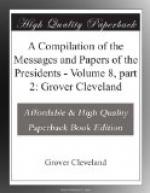The tariff of the last session was in its details not acceptable to the great interests of any portion of the Union, not even to the interest which it was specially intended to subserve. Its object was to balance the burdens upon native industry imposed by the operation of foreign laws, but not to aggravate the burdens of one section of the Union by the relief afforded to another. To the great principle sanctioned by that act—one of those upon which the Constitution itself was formed—I hope and trust the authorities of the Union will adhere. But if any of the duties imposed by the act only relieve the manufacturer by aggravating the burden of the planter, let a careful revisal of its provisions, enlightened by the practical experience of its effects, be directed to retain those which impart protection to native industry and remove or supply the place of those which only alleviate one great national interest by the depression of another.
The United States of America and the people of every State of which they are composed are each of them sovereign powers. The legislative authority of the whole is exercised by Congress under authority granted them in the common Constitution. The legislative power of each State is exercised by assemblies deriving their authority from the constitution of the State. Each is sovereign within its own province. The distribution of power between them presupposes that these authorities will move in harmony with each other. The members of the State and General Governments are all under oath to support both, and allegiance is due to the one and to the other. The case of a conflict between these two powers has not been supposed, nor has any provision been made for it in our institutions; as a virtuous nation of ancient times existed more than five centuries without a law for the punishment of parricide.
More than once, however, in the progress of our history have the people and the legislatures of one or more States, in moments of excitement, been instigated to this conflict; and the means of effecting this impulse have been allegations that the acts of Congress to be resisted were unconstitutional. The people of no one State have ever delegated to their legislature the power of pronouncing an act of Congress unconstitutional, but they have delegated to them powers by the exercise of which the execution of the laws of Congress within the State may be resisted. If we suppose the case of such conflicting legislation sustained by the corresponding executive and judicial authorities, patriotism and philanthropy turn their eyes from the condition in which the parties would be placed, and from that of the people of both, which must be its victims.
The reports from the Secretary of War and the various subordinate offices of the resort of that Department present an exposition of the public administration of affairs connected with them through the course of the current year. The present state of the Army and the distribution of the force of which it is composed will be seen from the report of the Major-General. Several alterations in the disposal of the troops have been found expedient in the course of the year, and the discipline of the Army, though not entirely free from exception, has been generally good.




